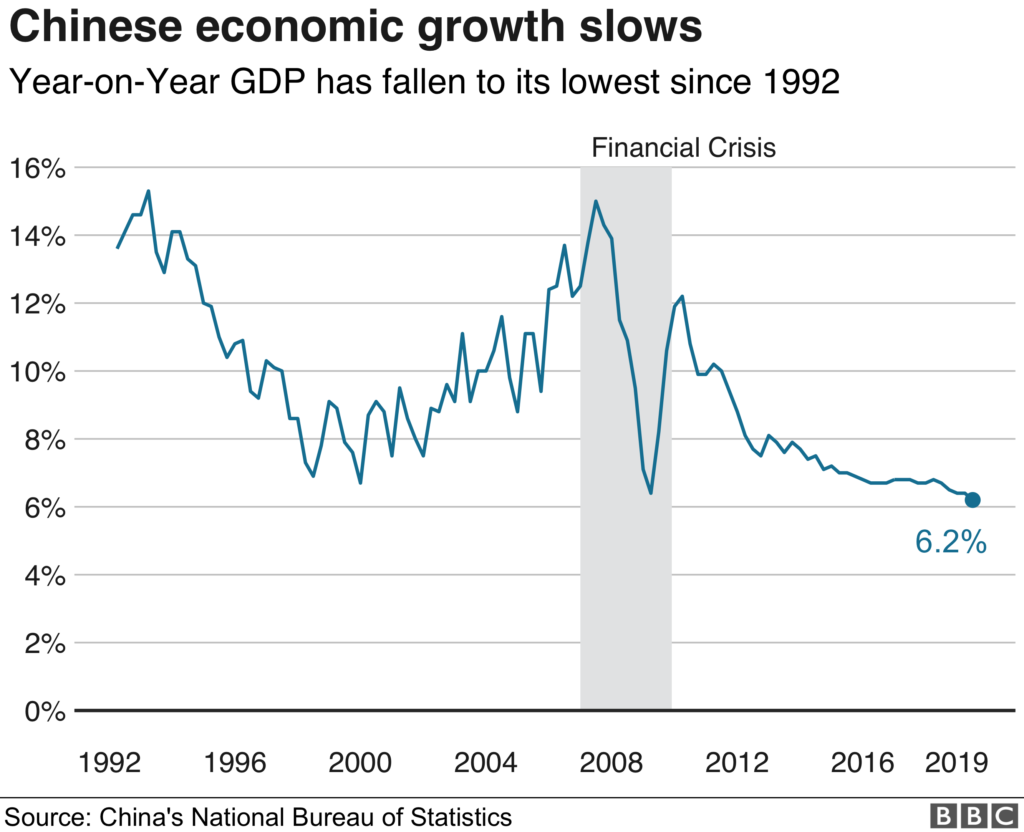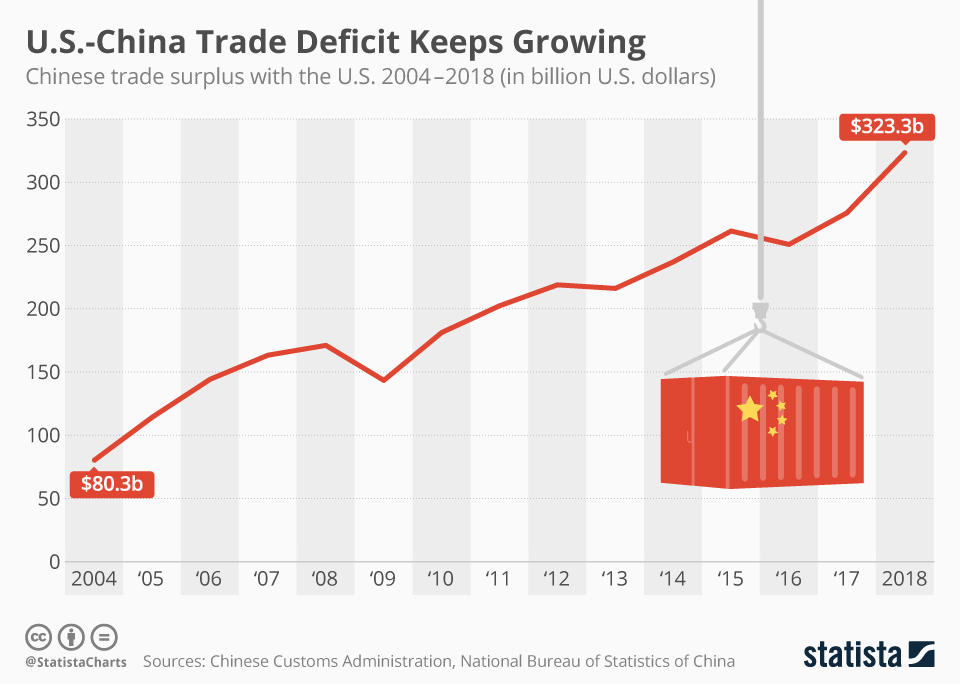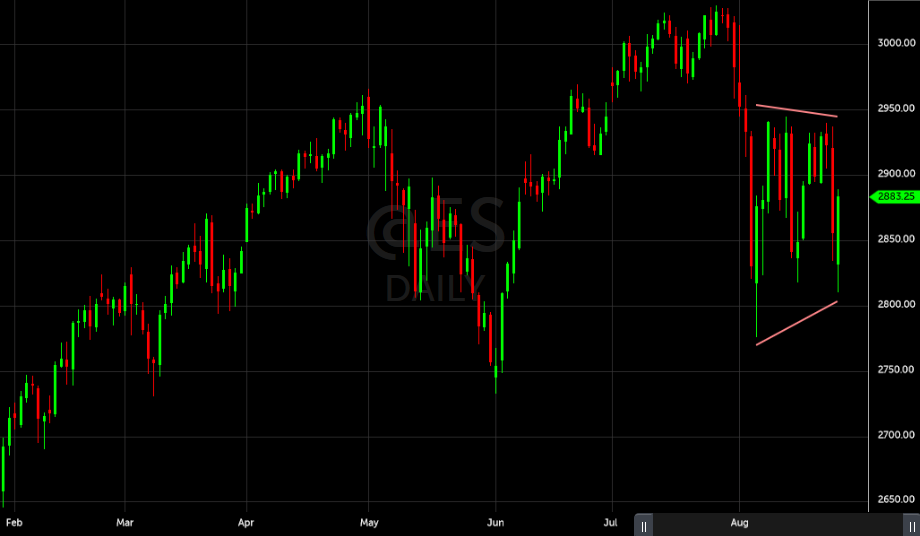The markets have been bouncing around in a consolidation range and have been flighty to say the least for most of August. Much of the volatility and quick reversals are centered on trade issues between the US and China, Japan, France, Germany, Mexico and Canada. President Trump is trying to get numerous deals done, which should be an overall positive for the markets, but his tweets, comments and confusing style have investors and traders strung out on anxiety.
Likely Outcome of China Trade Talks
Let’s face it, China got away with ripping-off the US for decades. Sure, they should have done business the right way, but they were allowed to get away with it. Corporations wanted access to China and politicians didn’t want to cause waves to the economy by disrupting business with China. This led to a number of what would be serious violations in trade practices in a normal world. Probably the greatest abuse has been their pattern of intellectual property theft against the US. Fortunately, these issues are being address and hopefully we can reach an agreement that stops these practices.
China’s economy is slowing and that is a main concern for Xi Jinping. It is growing at about 6 percent, which is healthy, but off from typical growth rates of around 10 percent. The tariffs Trump imposed against China and other trade restrictions are likely causing a further decline in growth. This puts Xi in a difficult situation, as he is facing economic slowdown and has to keep his people working. Another dilemma is that China will have to change the way they do business and Xi will basically have to admit all of their nefarious business dealings if a meaningful trade deal is signed.

I don’t see this being an easy process and the markets shouldn’t either. Trump likes to tweet to keep people updated, but probably more for negotiating tactics. Many economist don’t like the tariffs, but something has to be done to show we are going to be tough on negotiations. This is something China isn’t used to. I don’t like tariffs in general, but I feel it is a tool that can be used effectively in this case.
The Politics of a Trade Deal
President Trump has an election next year and an unresolved trade issue with a slowing economy wouldn’t help his cause. Xi has already used this against Trump by imposing trade restrictions on agriculture and other products that directly affect his likely voters. The interesting thing here is that Trump hasn’t let his foot off the gas. Most politicians would have caved at this point, but Trump is showing some resolve. This must have Xi a little worried and realizing he will have to give up more than expected to reach a deal with the US.
While many US investors would just like to see a deal get done without any pain, it doesn’t seem likely. Trump has dealt with a decent amount of criticism within the US, probably due to his unorthodox style and some people probably don’t want him to succeed for political purposes. Xi will probably exploit this weakness in the US to his advantage. I believe if this country clearly stood behind the President on getting a beneficial trade deal with China, Xi would lose a great deal of ammunition. Thus far, most consumers in the US have been unaffected, but some industries have felt the pain, especially the farmers.
I don’t believe a beneficial trade deal will be signed anytime soon, but it could boil down to whichever party can wait out the other and cause the most pain. Trump has to deal with the political issues, but he doesn’t seem to care. Xi has to keep his people working and grow their economy, otherwise their people could become unhappy and some unrest could happen in the country from the workers.
The Party with the Most to Lose
There is no doubt that the US has received the short end of the stick when it comes to doing business with China. Trump has made this known and realizes there is a lot of upside for the US to any deal that is made. China, therefore, will have to make some concessions and their business with the US will have to change. That will be a hard pill for China to swallow, but if they do it properly both China and the US could have immense economics benefits in the long-term. The short-term could be a little painful for China.

It makes sense on paper for both parties to do a trade deal, but let’s face it…we are dealing with China. Nothing politically seems to come easy with these folks, which is similar to Russia. President Xi doesn’t have to worry about elections and their rulers don’t typically like to “give in” to the US. The most important thing here is that China has more to lose than the US if both parties cut ties. China has run an outrageous trade surplus with the US for many years. Not to mention they stole intellectual property from most of the S&P 500 500 companies to quickly advance their business practices and technologies. This includes government run hacking operations and corporate espionage.
The US would like to further develop access to Chinese consumers and use their lower cost manufacturing capabilities. The interesting thing is that US corporations have already been moving into other countries like Vietnam, Indonesia, Malaysia, India and Thailand. These countries all have their issues, but look at the issues we’ve had with China. These countries can typically be more economically feasible and it may just be a matter of time before they have a manufacturing supply channel to rival China.
A US exodus away from China could have a crippling effect on China’s economy. This would be detrimental to China’s long term plans of becoming the dominant economic and military force in the world. This may be the strongest card Trump has to play against China. In fact, he probably has the stronger hand in negotiating in this deal and likely knows it.
Timing of a Trade Deal and Resolution
I don’t see a deal getting signed this year. Xi would probably want to take his chances that Trump doesn’t get reelected. He would likely get a much more favorable deal from the new President or maybe the new President would just resume business as usual without forcing a new deal. Trump has already countered this by saying he will be even tougher on China if he wins reelection, so Xi should do a deal before then. If Trump wins, he will probably turn up the volume with China, as hard as that is to imagine. I believe Xi would sign a deal as quickly as possible after the election if Trump wins.
Xi probably won’t feel the pressure unless their economy slows enough to cause unrest with their working class. The threat of US manufacturing pulling out of China will also cause a great deal of pressure. China has already overbuilt their country with ghost towns and now they are losing jobs due to a slowing economy. I would think Xi is feeling the pressure, but it is hard to tell exactly what is going on behind their curtain. It is in China’s interest to delay a deal as long as possible as long as the status quo remains. Trump knows this and he will probably keep as much pressure on them as possible.
Thus far, the tariffs have hurt China more than the US. It remains to be seen if more tariffs are to come or other economic instruments will be used. This could get really ugly, but the escalation can’t last too long. There will probably be a deal or a cooling off period if things start to get too ugly and the economies suffer too much.
President Trump is trying to seal trade deals with Japan, Great Britain and other countries around the world. This will put pressure on China to do a deal or miss out on some of the trade benefits. It also helps align more of the world with the US, so China would then look like an outlier. This may also embolden other countries to try to get better deals with China. That would somewhat turn the tables on China. It is much like the scenario where one kid finally stands up to a bully and then nobody fears the bully anymore.
Financial Markets Impact of Trade Negotiations
The financial markets started to get spooked this August when our President imposed more stiff tariffs on China. They, in turn, retaliated and the markets got spooked. This came at a time when it looks like our economy is starting to slow and Europe may be headed into a recession. The fear among traders is that an escalating trade war with China could push us closer to recession. I don’t believe we will go into a recession, but the economy will probably slow without a resolution to a trade deal with China and a slowing Europe doesn’t help.

The beginning of August had a sharp selloff in stocks and bonds rallied sharply. Commodities also went down with stocks, as they would suffer from a weaker economy and uncertainty on trade. Gold acted as a flight to safety and remains strong. After the selloff, the stock market switched gears and went into a wild consolidation trade that is basically up sharply one day, down sharply the next. Eventually the market will break out of this range.
This pattern is a tough read. It is either another consolidation in an overall uptrend or it is a pause before another sharp selloff. The volume on the exchanges has been light due to many traders on summer vacation, but the next couple of weeks should give us more volume and possibly a breakout higher or lower.
Since the market is in a long term uptrend and has shaken off events like this numerous times, a good argument can be made that the equity markets will resume higher. However, I am leaning more to a downside breakout. I’m saying the market has topped, but maybe a shakeout to the downside to clear out some of the weak hands could happen. President Trump certainly likes to use the stock market performance as talking point and will probably throttle his activity to best support the market. The Fed will probably lower rates in the near future and there is plenty of upside in the markets if / when a China trade deal is completed.




